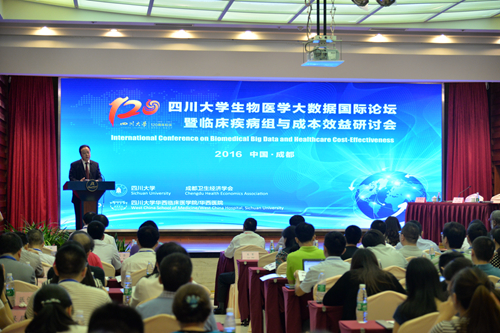
On June 16th, the International Conference on Biochemical Big Data and Healthcare Cost-Effectiveness was Held in Chengdu, and attended by worldwide specialists and scholars in the field of Biochemical Big Data and representatives of SCU professorss and students.
Prof. Li Hong, EVP of SCU and Director Li Weimin of the West China Hospital addressed the conference. A keynote speech themed with Health Big Data and Chinese Hygiene informatization Construction was delivered by Ren Meng-qun, director of the Statistics & Information Center under the National Health and Family Planning Commission of the People’s Republic of China. And Prof. Matthew Boulton from the University of Michigan, U.S., introduced general conditions of the School of Public Health.
By fully tapping the biochemical big data, the Conference aims to provide research directions and management ideas on guiding the living behavior changes, disease prevention and treatment, scientific deployment of medical and health resources, construction of reasonable medical care service model and medical insurance payment system, establishment of new hospital management mode and clinical service mode, etc. It also focuses on the exploration of applications in the database establishment and integration, data drilling and mining, clinical diagnosis and treatment techniques and methods, etc.
As one of the academic activities during the 120th anniversary of SCU, the specialists and scholars participating in the Conference had in-depth and extensive discussions on research and utilization of medical big data. This could drive the research and utilization of medical big data, providing more methods and much broader horizon of medial big data research.
SCU plans to establish a biomedical big data research platform to integrate quality resources in the affiliated hospitals and colleges of SCU, including the College of Software Engineering, College of Mathematics and the College of Life Sciences. Thus, a biomedical big data research institute spanning cities, provinces and countries can be shaped to accelerate the scientific research of domestic biomedical big data.


